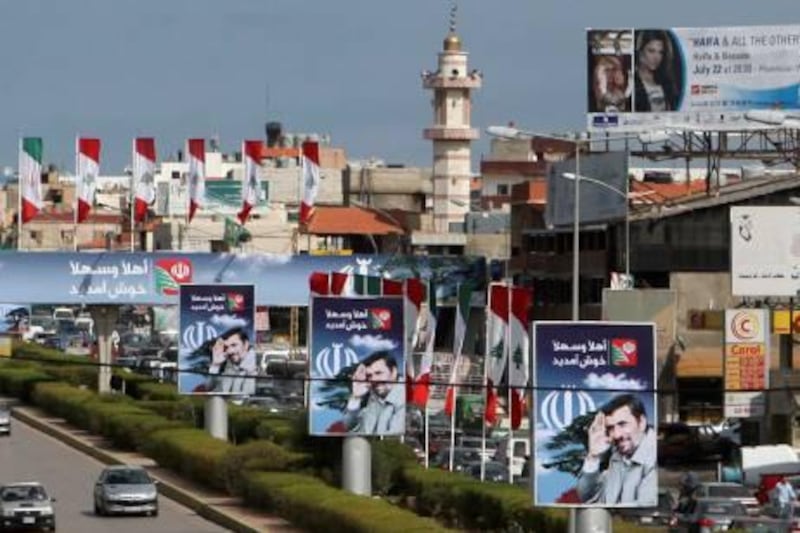TEHRAN // Iran's president, Mahmoud Ahmadinejad, is using his controversial trip to Lebanon to deflect attention at home from the country's deeply troubled economy as well as rising political tensions with his conservative rivals, analysts say.
At the same time, the visit, which starts tomorrow, is designed to project Iran's strength in the face of international efforts to isolate it over its nuclear programme, they added. The publicity-loving president hopes to highlight his "popularity on the Arab street while stressing to Israel that Iran possesses an important deterrent in Hizbollah", said Ali Ansari, an Iran expert at St Andrews University in Scotland.
Iran's television viewers will be shown their populist president feted as a popular resistance hero by what are sure to be large crowds at rallies hosted by Hizbollah. Mr Ahmadinejad's jaunts abroad are often scene stealers, full of sound and fury, like his visit to New York last month for the annual UN General Assembly, where he basked in the US media spotlight. No sooner was his Lebanese trip announced than Iran proclaimed it was ready to hold nuclear talks with six major world powers this month or in early November.
"It's almost like a magician who's got to pull another rabbit out of the hat internationally to keep everyone [at home] looking the other way," said Scott Lucas, an Iran expert at Birmingham University in England. But Mr Ahmadinejad will have to tread carefully if his trip is to be a personal success without harming Hizbollah, Iran's Shiite ally that is a core element of the Islamic republic's regional strategy.
"While he will undoubtedly lambast Israel and support resistance, he cannot be perceived as undermining national unity [in Lebanon] because that harms Hizbollah, which is currently in need of national unity," said Farideh Farhi, an Iran expert at the University of Hawaii. Iran smoothed Mr Ahmadinejad's path to Lebanon last week by agreeing to invest US$450 million (Dh1.65 billion) in the country's water and energy sectors: a blandishment that should benefit the Mediterranean country as a whole.
His visit, however, will probably not have much in common with that made to Lebanon by his predecessor in 2003. Mohammad Khatami, a mild-mannered philosopher-politician, was received warmly by groups that spanned Lebanon's political spectrum. It was on his watch three years earlier that Israeli forces, facing Hizbollah attacks, finally withdrew from southern Lebanon after 18 years of occupation. During his visit, Mr Khatami had harsh language for Israel, but he also called for moderation and restraint in the region, as well as detente with the United States.
Israeli and US misgivings about Mr Ahmadinejad's Lebanese trip have delighted Iranian hardliners. Kayhan, a daily newspaper close to the supreme leader, Ayatollah Ali Khamenei, claimed that Mr Ahmadinejad's visit has "caused deep concern to the US, the Zionist regime [Israel] and some Arab states in the region". It would also damage or even "bring to a standstill" the "so-called peace talks" between the Palestinians and Israelis, it said.
Farda News, a conservative website close to Tehran's mayor, Mohammad Baqer Qalibaf, accused the West and Israel of trying to revive the "baseless" notion of a "Shiite crescent" to persuade Lebanon to cancel Mr Ahmadinejad's visit. Such "Iranophobia" would fail because "everyone now understands that the activities and nature of the Resistance Front is resistance against occupation and oppression and there is no difference between Shiites and Sunnis in the region", Farda News said.
But hardline Iranian media have focused mainly on a tongue-in-cheek suggestion - which they took at face value - by a columnist for the Israeli daily Haaretz, that Israeli forces should abduct Mr Ahmadinejad and bring him to trial "as an inciter to genocide and Holocaust denier". Hardline enthusiasm aside, Mr Ansari said, "large swathes" of the Iranian population will probably be ambivalent about Mr Ahmadinejad's Lebanese excursion because they are "more concerned with the economy". Many Iranians voted for him because he promised to fight corruption and pledged to ensure the poor received a fairer share of Iran's oil wealth.
Now, grappling with rising unemployment and high inflation that is expected to get even worse once he finally implements long-stalled plans to remove subsidies on essential goods, many are angered by Iran's funding of Hizbollah. A common chant at opposition rallies that followed Mr Ahmadinejad's disputed re-election last year was: "No Gaza, no Lebanon, my life for Iran." Officials close to the Islamist movement say they have spent about US$1billion (Dh3.67bn) of Iranian money since 2006 on aid and rebuilding after its war with Israel, Reuters reported yesterday.
Michael Theodoulou reported from Nicosia






